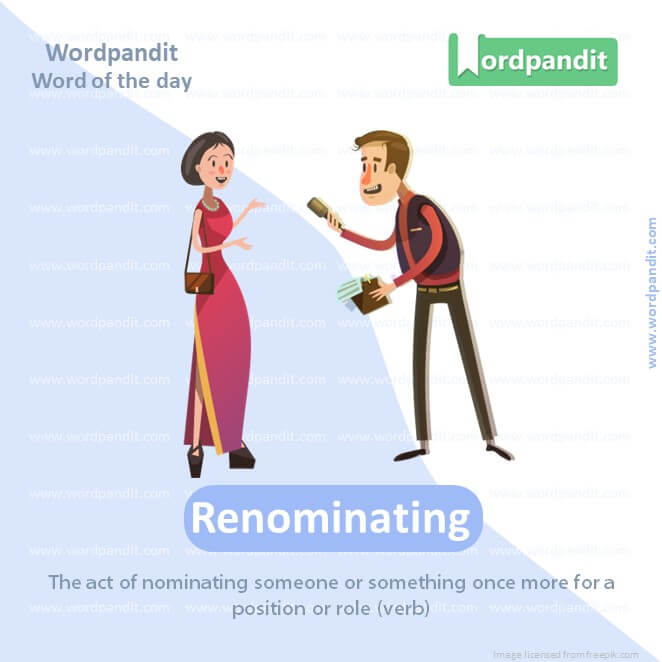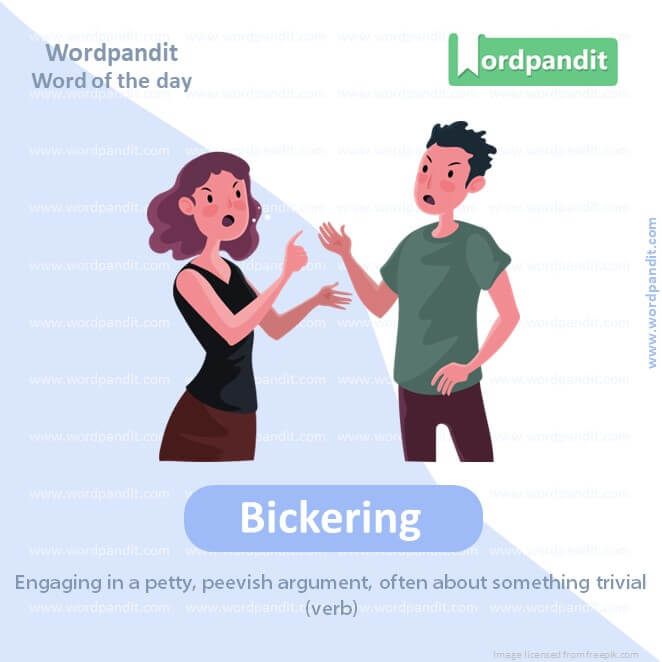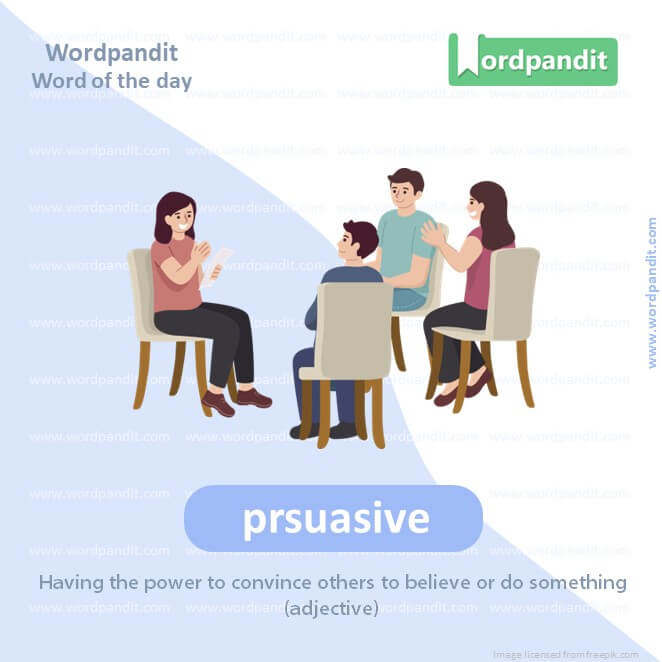Daily Vocabulary Words: List of Daily Used Words in Leading International Newspapers
Hi there. Welcome to this special section @ Wordpandit.
Our endeavour here is very simple: to highlight important daily vocabulary words, which you would come across in leading newspapers in the country. We have included the following newspapers in our selection:
• The New York Times
• The Washington Post
• Scientific American
• BBC
• The Guardian
• Psychology Today
• Wall Street Journal
• The Economist
We are putting in extensive work for developing your vocabulary. All you have got to do is be regular with this section and check out this post on a daily basis. This is your repository of words that are commonly used and essentially, we are posting a list of daily used words. Hence, this has significant practical application as it teaches you words that are used commonly in leading publications mentioned above.
Visit the website daily to learn words from leading international newspapers.

WORD-1: Renominating
CONTEXT: Before you completely resign yourselves to renominating a man about whose character and temperament you harbor misgivings
SOURCE: Washington Post
EXPLANATORY PARAGRAPH: Imagine your friend was picked to be the leader for a game yesterday and everyone had so much fun. Today, you all decide to pick a leader again and choose the same friend because they did such a good job. That’s like renominating, picking someone again because they were really good the first time.
MEANING: The act of nominating someone or something once more for a position or role (verb).
PRONUNCIATION: ree-nom-uh-nay-ting
SYNONYMS: reelecting, reappointing, reselecting, rechoosing, reaffirming, endorsing again
USAGE EXAMPLE:
1. She was renominated as team captain because of her excellent leadership.
2. The director is being renominated for another term.
3. After his successful project, he was renominated for the award.
4. The party is considering renominating the current mayor.

WORD-2: Bickering
CONTEXT: The first two debates this year have sounded much the same, with at least seven candidates bickering among themselves
SOURCE: New York Times
EXPLANATORY PARAGRAPH: Bickering is when you and your brother or sister argue over small, not important things, like who gets to play with a toy or who gets to sit by the window. It’s like a little fight with words that isn’t really about something big.
MEANING: Engaging in a petty, peevish argument, often about something trivial (verb).
PRONUNCIATION: bick-er-ing
SYNONYMS: quarreling, arguing, squabbling, wrangling, disputing, spatting
USAGE EXAMPLE:
1. The children were bickering over whose turn it was to play the video game.
2. They spent the whole meeting bickering about details.
3. Bickering siblings can be quite a headache for parents.
4. The bickering between the two friends was over a simple misunderstanding.
WORD-3: Winnowed
CONTEXT: This time, though, the field has winnowed.
SOURCE: New York Times
EXPLANATORY PARAGRAPH: Imagine you have a box full of toys but some are broken. So, you take out all the broken ones and keep only the good ones. Winnowing is like when farmers remove all the bad parts of their grain so only the good part is left.
MEANING: To remove or separate the undesirable parts from something (verb).
PRONUNCIATION: win-ohd
SYNONYMS: sifted, sorted, separated, filtered, screened, refined
USAGE EXAMPLE:
1. The farmer winnowed the chaff from the wheat.
2. She winnowed her list of friends to include only the closest.
3. The selection committee winnowed the applications down to ten.
4. After winnowing the evidence, only a few clues were left.

WORD-4: Persuasive
CONTEXT: I don’t find either one especially persuasive.
SOURCE: Washington Times
EXPLANATORY PARAGRAPH: Persuasive is when you’re really good at getting someone to agree with you or to do something because you give really good reasons. Like when you talk your mom into getting you an extra scoop of ice cream by saying you ate all your veggies.
MEANING: Having the power to convince others to believe or do something (adjective).
PRONUNCIATION: per-sway-siv
SYNONYMS: convincing, compelling, influential, effective, cogent, forceful
USAGE EXAMPLE:
1. He gave a very persuasive argument for why we should recycle.
2. The advertisement was persuasive, and she decided to buy the product.
3. Her persuasive speech won her the debate competition.
4. You need to be persuasive when you are raising funds for a cause.

WORD-5: Intellects
CONTEXT: serious public servants with serious intellects.
SOURCE: Al Jazeera
EXPLANATORY PARAGRAPH: Intellects are like super-smart brains. It’s when people can think really well and know a lot of things. Like the way a teacher knows lots of answers or when you figure out a hard puzzle.
MEANING: The power of the mind to think and understand in a logical way (noun).
PRONUNCIATION: in-tuh-lekts
SYNONYMS: brains, minds, thinkers, geniuses, scholars, intellect
USAGE EXAMPLE:
1. Great intellects like Einstein changed the way we understand the world.
2. The conference gathered many intellects from around the globe.
3. The school nurtured the intellects of its students.
4. A meeting of intellects can result in amazing ideas.

WORD-6: Renegade
CONTEXT: a renegade former member of Russia’s parliament, has a provocative idea.
SOURCE: Guardian
EXPLANATORY PARAGRAPH: A renegade is like someone in a movie who used to be part of a group but decides to leave and do things their own way, even if it means the group might not like it.
MEANING: A person who rejects a cause, allegiance, religion, or group for another; an outlaw (noun).
PRONUNCIATION: ren-eh-gayd
SYNONYMS: rebel, traitor, deserter, maverick, defector, turncoat
USAGE EXAMPLE:
1. The renegade soldier joined the other side of the conflict.
2. He was considered a renegade for not following the family tradition.
3. The renegade member of the band started a solo career.
4. Stories of renegades in the Wild West are common in folklore.
WORD-7: Intriguing
CONTEXT: And while his ideas are intriguing, there’s no way to independently confirm some of the claims and assertions he makes.
SOURCE: Guardian
EXPLANATORY PARAGRAPH: Intriguing is when something is so interesting and cool that you really want to know more about it. Like when you see a magician do a trick and you can’t figure out how they did it.
MEANING: Arousing the curiosity or interest by being unusual or very interesting (adjective).
PRONUNCIATION: in-tree-ging
SYNONYMS: fascinating, captivating, compelling, engrossing, interesting, absorbing
USAGE EXAMPLE:
1. The detective found an intriguing clue at the crime scene.
2. She told us an intriguing story about her travels.
3. The mystery book was so intriguing that he read it in one day.
4. The idea of time travel is intriguing to many people.
WORD-8: Stalemate
CONTEXT: the stalemate that has developed in Ukraine — bluntly described last week by Gen.
SOURCE: Guardian
EXPLANATORY PARAGRAPH: Stalemate is like when you’re playing a game and no one can win because every move has been blocked. It’s like a tie where the game just can’t go on anymore.
MEANING: A situation where no progress can be made or no advancement is possible; a deadlock (noun).
PRONUNCIATION: stayl-mayt
SYNONYMS: deadlock, impasse, standstill, draw, tie, deadlock
USAGE EXAMPLE:
1. The chess game ended in a stalemate.
2. The negotiations reached a stalemate and no agreement was made.
3. They were at a stalemate in their discussion and couldn’t decide.
4. To avoid a stalemate, both sides must be willing to compromise.
WORD-9: Fanatic
CONTEXT: As Ponomarev calmly laid out his coup plans in a Washington living room, he didn’t sound like a fanatic revolutionary.
SOURCE: Al Jazeera
EXPLANATORY PARAGRAPH: A fanatic is someone who likes something so much that they get really, really excited about it, more than most people. Like if you love dinosaurs so much that you read all about them and have lots of dinosaur toys.
MEANING: A person filled with excessive and single-minded zeal, especially for an extreme religious or political cause (noun).
PRONUNCIATION: fuh-nat-ik
SYNONYMS: zealot, enthusiast, extremist, devotee, aficionado, supporter
USAGE EXAMPLE:
1. He is a sports fanatic who never misses a game.
2. The fanatic was determined to spread his beliefs.
3. She is a health fanatic, always eating well and exercising.
4. The movie fanatic had an impressive collection of memorabilia.
WORD-10: Precisely
CONTEXT: In a crisis, a small, disciplined force can play a decisive role,” he said. And that’s precisely his aim.
SOURCE: Al Jazeera
EXPLANATORY PARAGRAPH: Precisely is when something is exactly right or perfect. Like when you fit the last piece of a puzzle in the exact right spot, it fits precisely.
MEANING: In exact terms; without any error (adverb).
PRONUNCIATION: preh-sies-lee
SYNONYMS: exactly, accurately, correctly, just, squarely, right
USAGE EXAMPLE:
1. She followed the recipe precisely and the cake turned out great.
2. The clock struck twelve precisely as the new year began.
3. You must measure the ingredients precisely when baking.
4. His prediction was precisely correct.
vocabulary NDA
Understanding the Vocabulary NDA (Non-disclosure Agreement) is a crucial step in the world of business and law. These terms are not just a compilation of complex words, but a key to decoding legal implications that could affect your business.
Essentially, the Vocabulary NDA refers to the specific set of terms and phrases typically present in a non-disclosure agreement. Broadening your knowledge on this could significantly enhance your comprehension, allowing you to navigate the legal landscape more smoothly.
Mastering the vocabulary NDA starts by contextualizing. While it may sound highly technical, relating each term to real-world scenarios greatly facilitates one’s learning process. Realize that the words in the vocabulary NDA are not arbitrary; they align with certain legal concepts, circumstances, and proceedings.
Secondly, repetition plays an integral role. Regular exposure to the vocabulary NDA strengthens one’s memory, promoting the retention of information. Consider engaging in relevant discussions, reading articles, listening to podcasts, or even simply reviewing a non-disclosure agreement. This repetitive interaction ultimately ingrains the vocabulary NDA into one’s cognitive system.
The vocabulary NDA becomes less intimidating through practical application. It’s essential to apply these terms in actual situations – be it drafting your own NDA, or merely examining an existing one. This invites an in-depth understanding, making the vocabulary NDA more familiar and comprehensible.
Lastly, remember to continuously expand and refine the vocabulary NDA. Legal terminologies evolve, and so should your lexical prowess. Stay updated with new terms and modifications in law that could modify the existing vocabulary NDA.
To sum it up, learning the vocabulary NDA requires relatability, repetition, practical application, and continuous learning. Leverage these strategies, and break your barriers to legal fluency. Unfurl the complexities of the vocabulary NDA, for it’s a secret tool in your success arsenal.









